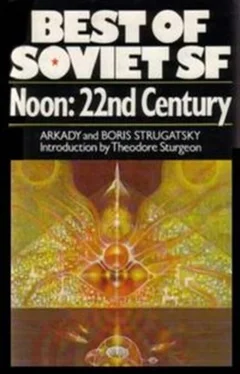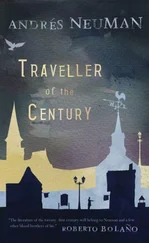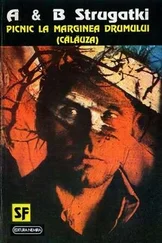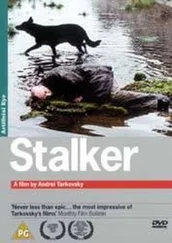Kondratev snorted into his soup spoon, and Gorbovsky looked reproachfully at Slavin.
“Ah, Evgeny!” he said. “How can you joke like that? Here you are laughing, while I’m shaking in my shoes, because the first contact with a newly discovered civilization is a historic occasion, and the slightest blunder could bring harm down on our descendants. And our descendants, I must say to you, trust us implicitly.”
Kondratev stopped eating and looked at him.
“No, no,” Gorbovsky said hurriedly. “I can’t vouch for our descendants as a whole, of course, but take Petr Petrovich—he expressed himself quite explicitly on the question of his trust in us.”
“And whose descendant is this Petr Petrovich?” asked Kondratev.
“I can’t tell you any more than that. It’s clear from his patronymic, however, that he is the direct descendant of someone named Petr. We didn’t discuss it with him, you see. Would you like me to tell you about what we did discuss with him?”
“Hmm,” said Kondratev. “What about washing the dishes?”
“No, I will not. It’s now or never. People should lie down for a while after a meal.”
“Right!” exclaimed Slavin, turning over on his side. “Go ahead and tell us, Leonid.”
And Gorbovsky began to tell them. “We were traveling on the Tariel to EN 6—an easy flight and not a very interesting one—taking Percy Dickson and seventy-seven tons of fine food to the astronomers there, and then the concentrator blew up on us. God alone knows why—these things happen sometimes even now. We hung in space two parsecs from the nearest base and quietly began to prepare for entry into the next world, because without the plasma concentrator you can’t even think about anything else. In this spot, as in any other, there were two ways out: open the hatches immediately, or first eat the seventy-seven tons of the astronomers’ groceries and then open the hatches. Mark Falkenstein and I held a meeting over Percy Dickson in the wardroom, and started making up our minds. Dickson had it easy—he had been conked on the head and was still unconscious. Falkenstein and I quickly came to the conclusion that there was no need to hurry. It was the greatest task that we had ever set ourselves—the two of us (there was no hope for Dickson) would annihilate seventy-seven tons of provisions. We could stretch it out for thirty years, anyhow, and after that would be time enough for opening the hatches if we had to. The water and oxygen regeneration systems were in perfect shape, and we were moving with a velocity of two hundred fifty thousand kilometers per second, and we still had the prospect of seeing all sorts of unknown worlds before we got around to the Next One.
“I want to make sure you understand our situation—it was two parsecs to the nearest inhabited point, and there was hopeless void around us, and on board there were two of us alive and one half-dead—three people, note; precisely three, and I say that as ship’s captain. And then the door opens, and into the wardroom walks a fourth. At first we weren’t even surprised. Falkenstein asked rather impolitely, ‘What are you doing here?’ And then suddenly it sank in, and we jumped up and stared at him. And he stared at us. Average height, thin, pleasant face, didn’t have all that frizzy hair that, say, Dickson has got. Only his eyes were unusual—they had the look of a pediatrician’s. And another thing—he was dressed like a spacer during a mission, but his jacket buttoned from right to left. Like a woman’s. Or, according to rumor, like the Devil’s. That surprised me most of all. And while we were looking at each other, I blinked, and looked again, and now his jacket buttoned the proper way. So I sat down.
“‘Hello,’ said the stranger. ‘My name is Petr Petrovich. And I know your names, so let’s not waste time on that. Instead we’ll see how Doctor Percy Dickson is doing.’ He shoved Falkenstein aside rather unceremoniously and sat down next to Dickson. ‘Excuse me,’ I say, ‘but are you a doctor?’ ‘Yes,’ he says, ‘you could say that.’ And he starts undoing the bandage around Dickson’s head. Laughing and joking, you know, like a kid undoing a candy wrapper. A chill actually ran across my skin. I looked at Falkenstein—he’s turned pale and is just opening and shutting his mouth. Meanwhile, Petr Petrovich had taken off the bandage and exposed the wound. The wound, I should tell you, was horrible, but Petr Petrovich kept his cool. He spread his fingers wide and started massaging Dickson’s skull. And, can you imagine, the wound closed up! Right before our eyes. There was no trace of it left. Dickson turned over on his right side and started snoring as if nothing had happened to him.
“‘Let him get his sleep now,’ says Petr Petrovich. ‘And meanwhile you and I will go see what things are like in the engine room.’ And he took us to the engine room. We walked after him like sheep. Except that, in contradistinction to sheep, we didn’t even bleat. As you can imagine, we were simply speechless. We hadn’t gotten any words ready for such an encounter. Petr Petrovich opens the hatch to the reactor and crawls right into the concentration chamber. Falkenstein gave a cry, and I shouted, ‘Be careful! Radiation!’ He looked at us thoughtfully, then said, ‘Oh, yes, right. Leonid and Mark,’ he says, ‘you go straight to the control room, and I’ll be along in a minute.’ And he closed the hatch behind him. Mark and I went to the control room and started pinching each other. We pinched silently, fiercely, cruelly. But neither of us woke up. And two minutes later the instruments come on, and the concentrator board shows the contraption is in a number-one state of readiness. Then Falkenstein stopped pinching and said in a low voice, ‘Leonid, do you know how to perform an exorcism?’ He had just said that when in came Petr Petrovich. ‘Ah,’ he says, ‘some starship you have here, Leonid. And some coffin. I admire your daring, comrades.’ Then he suggests that we sit down and ask him questions.
“I started to think furiously about what would be the smartest question to ask him while Falkenstein, a profoundly practical man, inquired, ‘Where are we now?’ Petr Petrovich smiled sadly, and at the same instant the walls of the control room became transparent. ‘There,’ says Petr Petrovich, and he points. ‘Right there is our Earth. Four and a half parsecs. And there is EN 6, as you call it. Change course by six-tenths of a second and go straight into deritrinitation. Or maybe,’ he says, ‘I should throw you right over to EN 6?’ Mark answered touchily, ‘Thanks just the same, but don’t bother, we’d rather do it ourselves.’ And he took the bull by the horns and started orienting the ship. Meanwhile I had been thinking about a question, and all the time into my head came something about ‘the eternal silence of the infinite spaces.’ Petr Petrovich laughed and said, ‘Well, all right, you’re too shaken up now to ask questions. And I must be on my way. They’re expecting me back in those infinite spaces. I think I had better explain briefly.
“‘You see, I am your remote descendant,’ he says. ‘We, the descendants, very much like to drop in on you, our ancestors, every now and then. To see how things are going, and to show you what you will be like. Ancestors are always curious about what they will be like, and descendants, about how they got that way. But I’ll tell you frankly that such excursions are not exactly encouraged. We’ve got to watch what we’re doing with you ancestors. We could goof something up and turn history head over heels. And sometimes it’s very hard to refrain from intervening in your affairs. It’s all right to intervene the way I’m doing now. Or like another friend of mine. He ended up in one of the battles near Kursk and took it upon himself to repel a German tank attack. He got himself killed, chopped into kindling. Terrible even to think about. Of course he didn’t repel the attack by himself, so nobody noticed. And another colleague of mine tried to wipe out the army of Genghis Khan. They hardly even slowed down… Well, that’s it, more or less. I’ve got to go now—they’re probably worrying about me already.’
Читать дальше












